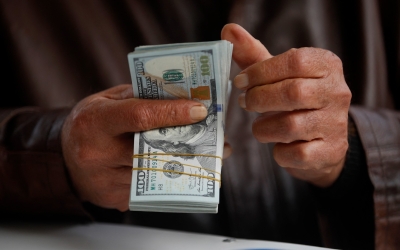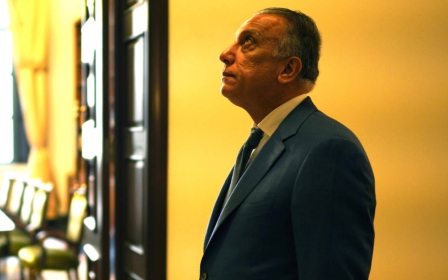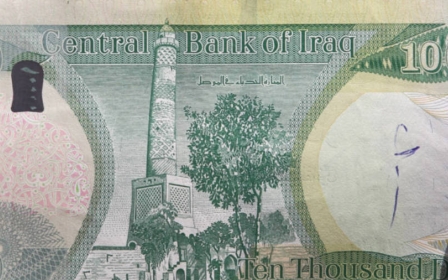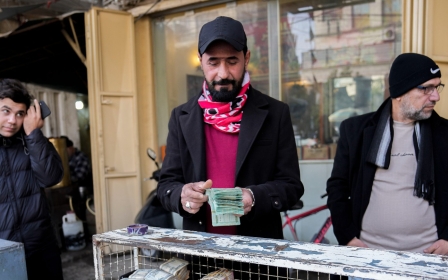Iran stopped buying Iraq’s illicit dollars. But is it getting them another way?
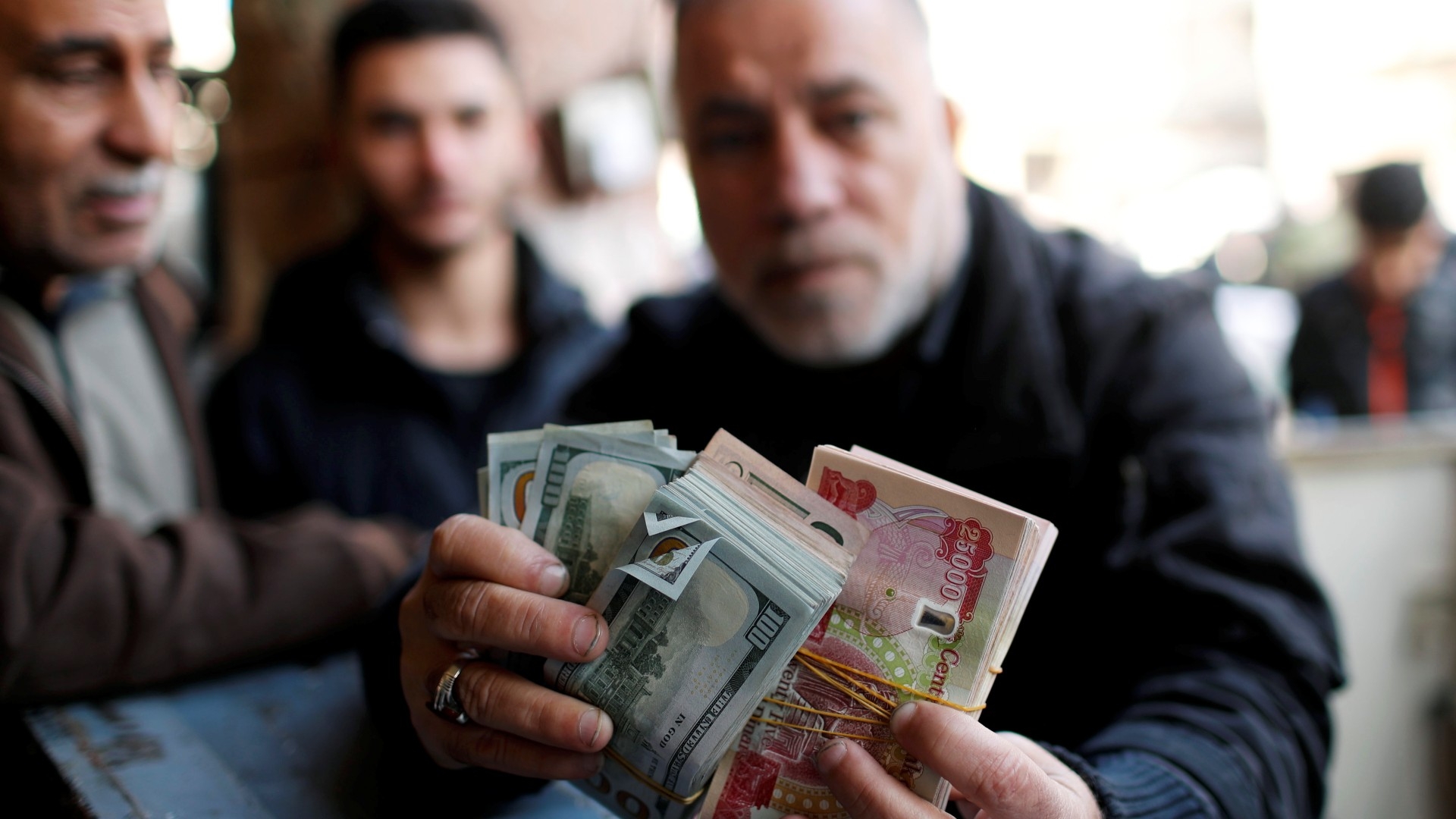
Iran has been haemorrhaging money by buying US dollars on the Iraqi black market and is now pressuring Iraq’s government to pay its debts to Tehran through official channels, Iraqi officials told Middle East Eye.
Neighbouring Iran has been Iraq’s most important market over the past two decades, providing gas, electricity, food, and construction materials, amongst other necessities, with trade between the countries totalling about $14bn annually.
Yet since the US imposed a harsh sanctions regime on Iran in 2018, Iraq has struggled to be able to pay for its Iranian goods and services. Last year, Iraq was able to pay off most of its gas and electricity debt from 2019-2021 in Iraqi dinar.
Those dinars were at first converted into US dollars (which are far more useful to Iran) through a daily currency auction held by the Iraqi Central Bank. But Washington in November imposed restrictions on the auction so anonymous people and sanctioned countries like Iran could no longer use the service to obtain dollars.
That meant the Iranians began to heavily rely on the Iraqi black market to get its dollars, Iraqi officials and politicians close to Iran told MEE.
With currency exchanges on the black market hitting a high, exchange rates began to rise in an alarming manner, raising the prices of consumer goods and leaving the Iraqi government struggling to pay salaries, pensions, and benefits.
Meanwhile, illicit dollars flowed into Iran, Turkey, Oman, and Dubai, officials said.
In February, the exchange rate on the black market was around 1,800 dinars to the dollar, compared to 1,480 three months before.
The cost of exchanging dinars on the black market - both with the rising rates and fees for illicit deals - became significant.
Iraqi officials told MEE the Iranians were paying around 40 percent extra for every million dollars they changed, money that goes to brokers, intermediaries, and dollar smugglers who transfer the funds out of Iraq.
"The Iranians have incurred very large losses over the past four months as a result of their frantic quest to buy dollars from the black market, especially after the recent restrictions imposed by the US Federal Reserve on the currency sale auction," a senior Iraqi official told MEE.
Declining rates
Iraqi officials said the Iranians decided to stop buying dollars from Iraq’s black market last week.
Soon after, the black market exchange rate declined rapidly. The rate on Monday was 1,495 dinars per dollar compared to 1,580 the day before.
A large number of exchange companies, especially in the semi-autonomous Kurdistan region, which is the main land corridor for dollar-smuggling operations, began to make dollars available for anyone after reserving the currency for its most exclusive clients in February and March.
"The Iranians have no choice but to stop the process. It has turned into a drain and they are in no position to lose half of their money in exchange for dollars," a senior official involved in the issue told MEE.
"Fortunately, the market's response is quick. The dollar's exchange rates have begun to decline, and they will fall further in a few days," the official added.
"The exchange companies in Kurdistan were the major players in dollar-smuggling operations in recent months, so they took the initiative before anyone else to get rid of the large quantities of dollars they had stored, to reduce their losses."
It is too early to say for sure whether the rate’s decline and the decision by Kurdish exchange offices to offload dollars are a direct result of the Iranians ending their black market activities - especially as it’s not clear where Iran will now get its dollars.
Yet there has also been a remarkable increase in sales in the Central Bank’s currency auction during the past two weeks - only adding to the uncertainty.
Foreign currency auction data for the last week of March shows no less than $200m was sold per day on average, compared to $168.5m in the last week of February.
Most of these sales were amounts to cover “external transfers” and credit for prepaid electronic cards.
Ammar Khalaf Hamad, deputy governor of the Central Bank, told state-owned al-Iraqiya TV that the increase in activity was caused by all restrictions being lifted on the auctions.
However, Iraqi officials told MEE the US Federal Reserve has made no changes to the restrictions it forced on the auction, and that the increase in activity was caused by other factors, such as the trade ministry needing dollars to pay for food purchases.
"There is no change in the procedures imposed by the US Federal Reserve on the currency auction and there are no exceptions, but there is a gradual return of traders to participate in the auction away from private banks," the second senior official told MEE.
"The other large transfers are caused by the large withdrawal of dollars by citizens through electronic prepaid cards, and this is the latest mechanism for smuggling dollars.”
New smuggling mechanism
The foreign currency auction is the Iraqi Central Bank’s main way to obtain Iraqi dinars.
Most of the Iraqi government’s earnings are through oil sales. The dollars raised through these are held by the US Federal Reserve and then requested by Baghdad whenever it needs funds.
The Fed’s restrictions caused the Iraqi government a huge liquidity crisis, which the Central Bank has tried to ward off with a package of remedies, including allowing every Iraqi passenger to obtain $7,000 in cash at the airport.
By showing a valid plane ticket for that day along with proof that they have deposited sums in a local bank account that are the Iraqi dinar equivalent of $7,000, passengers can withdraw $7,000 from any exchange company, a local bank, or get it at the airport.
It was an opportunity that banking firms, financial mediators, and smugglers could not miss, and they quickly began to find new ways to obtain dollars by taking advantage of this development.
Some smugglers have been using fake tickets to obtain cash. Others have offered Iraqis free trips to Dubai, Turkey, Iran, and Lebanon in return for withdrawing $7,000. Iraqis have also been approached by smugglers and exchange companies asking if they can use their identities to get cash at the airport in return for payment.
Dozens of Iraqis, including government officials, have said they were surprised to find their names on the list of passengers who had received dollars, suggesting their identities had been stolen to get hold of cash.
'The Iranians have stopped buying smuggled dollars. They are now angry and reproachful because they hold us responsible for the losses they incurred'
- Advisor to Iraqi prime minister
Aware the system was being abused, on 14 March the Central Bank issued new instructions that reduced the traveller’s share to only $2,000.
As an alternative, people planning to travel outside Iraq were allowed to obtain $10,000 at the official exchange rate of 1,320 dinars through electronic prepaid cards issued by licenced banks and electronic payment companies that can only be used abroad but can be refilled if necessary.
In response, private banks and exchange companies then began issuing thousands of prepaid cards to Iraqis, who allowed the companies to use their identity papers in exchange for small sums of money.
The ruse was quickly identified by authorities, however, and customs began arresting travellers in possession of hundreds of prepaid cards.
On 30 March, customs officers at Baghdad airport arrested several travellers after finding 366 cards in their possession.
A day earlier, three passengers were arrested at Basra airport in possession of 522 cards.
Customs’ public data does not reveal where these passengers were heading, but Iraqi officials told MEE they were on their way either to Dubai or Jordan.
"The Iranians have stopped buying smuggled dollars. They are now angry and reproachful because they hold us responsible for the losses they incurred to obtain dollars," one of Iraqi Prime Minister Mohammed al-Sudani's advisors told MEE.
According to the advisor, people in Iran and Turkey are no longer smuggling dollars from Iraq, leaving Dubai and Jordan as the main destinations.
"This money is withdrawn from Jordan or Dubai, and then deposited in smugglers' accounts, which they provide to those who request quick transfers away from the supervision of the US Federal Reserve in exchange for large commissions," the advisor said.
Iranian pressure
Iraqi and Iranian officials said Iraq managed to pay all its debt to Iran in October, but the money was placed in a special account in the Trade Bank of Iraq, which Iran can use to purchase goods not targeted by US sanctions, like medicine.
Iran, however, wants to use the money Iraq owes it in any way it chooses.
Iraqi officials told MEE that Iran still has $8bn in this account, which it is unable to withdraw because the US Federal Reserve is keeping it under supervision.
The officials also revealed that Iraqi Foreign Minister Fuad Hussein and the governor of the Central Bank, Ali Mohsen al-Alaq, are conducting negotiations with US officials to find a suitable mechanism to get Iran this money.
“The Iranians say: ‘You have arranged all your papers with the Americans and left us. We want our money and nothing else,’" the advisor told MEE.
"We are currently seeking to find a compromise that satisfies both sides. We told the Americans: ‘We have done everything you asked, and you should give us something in return’.”
Iraq asked Washington for a waiver to allow it to pay Iran for its previous and future energy imports in dollars without any issues until further notice, the advisor added.
“The Americans said they understood our position and promised to make recommendations to the US Treasury Department, but we have not yet received a final response,” he said.
"Indications suggest that the Americans are going to gradually ease pressures on this issue."
Middle East Eye propose une couverture et une analyse indépendantes et incomparables du Moyen-Orient, de l’Afrique du Nord et d’autres régions du monde. Pour en savoir plus sur la reprise de ce contenu et les frais qui s’appliquent, veuillez remplir ce formulaire [en anglais]. Pour en savoir plus sur MEE, cliquez ici [en anglais].


